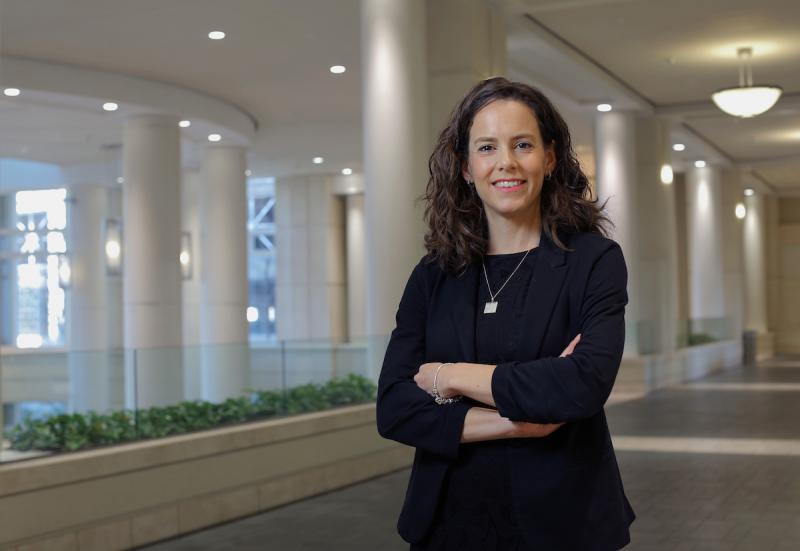
In 2016, the Duke School of Medicine selected 38 of its faculty for the new Duke Health Scholars and Duke Health Fellows Program. With funds from the Duke University Health System, the program supports the research efforts of early to mid-career clinician-scientists at Duke. Among the faculty honored are 14 individuals from the Department of Medicine, including Julia Scialla, MD, MHS, assistant professor of medicine (Nephrology) and Duke Health Scholar.
Chronic kidney disease takes a dreadful toll. Some 13 percent of adult Americans live with the condition. Despite that high prevalence, multitudes of mysteries persist about how chronic kidney disease progresses and how to stop or slow it.
Julia Scialla, MD, MHS, is eager to help change that with studies exploring the physiology of chronic kidney disease complications. Such complications frequently are linked to higher risk of end-stage renal failure and cardiovascular disease.
Unhealthy diets may exacerbate some complications. Better understanding the physiology in play could point the way to earlier preventive interventions for both individual patients and wide populations.
“The right place to solve this problem is to intervene earlier and see how we can prevent it. But we’re just at the beginning of understanding,” Scialla said.
Scialla first arrived at Duke as an undergraduate in 1995 where her pre-med studies led her to medical school at the University of Pennsylvania. During residency at Johns Hopkins Hospital, Scialla became intrigued by the complex and often challenging physiology at the core of nephrology.
From the start, however, Scialla knew she was interested in public health as well as patient care. To strengthen her ability to tackle problems on a population scale, Scialla studied epidemiology at Bloomberg School of Public Health.
Seeking treatment and prevention
On the faculty of the University of Miami, Scialla dug into metabolic acidosis and high serum phosphorus, two physiologic changes associated with poor outcomes among people with chronic kidney disease. Diets heavy in convenience foods appear to worsen those complications.
Diets lacking alkaline vegetable and fruits can promote metabolic acidosis, whereas convenience foods that frequently contain easily absorbed phosphorus-based additives may exacerbate phosphorus-related abnormalities. “If we find out these additives are harmful, they can be reduced, either with labeling or with a movement away from using them,” Scialla said.
The two imbalances are likely intertwined on the physiological scale, Scialla has concluded. High diet-based acid load may promote increased mobilization and excretion of phosphorus as a buffer for acid excretion in the urine. Building on previous observations in the Chronic Renal Insufficiency Cohort Study, Scialla is testing whether reducing acid load through healthier diets or doses of bicarbonate lessens acid imbalances and could improve kidney disease outcomes.
She is also uncovering biomarkers for early derangement of pathways that normally help balance acid and phosphorus. Such signals could one day allow physicians to identify these complications earlier and help assess whether taking medicine or eating healthier foods can normalize functioning in the pathways and improve health.
“I’m optimistic that these biomarkers would get used,” Scialla said. “I think there is a lot of interest around prevention.”
To better study phosphorus-based additives, Scialla's research team is working with data from the Jackson Heart Study, an epidemiologic cohort study of African Americans in the southeastern United States. Her lab is assessing if foods rich in absorbable phosphorus may contribute to cardiovascular and kidney disease.
Scialla’s work goes deeper. To better capture variation in vulnerability among different patients, she plans to explore how differences in people’s genes and potentially their microbiomes may affect phosphorus absorption, work probing the complexity of enzymes and hormones active in relevant absorption pathways.
“Julia has the inherent talent, training and drive to be a national leader in nephrology. She is already on that path,” said Myles Wolf, MD MMSc, chief of Duke’s Division of Nephrology who recruited Scialla to Miami while he was on faculty there.
Having joined Duke’s faculty in 2014, Scialla is also working on a project that could have a quicker payoff. Doctors already prescribe drugs intended to decrease phosphorus levels in the blood of patients on dialysis.
Her research team is using health records to compare the effectiveness of treatment regimens already prescribed to patients on dialysis to try to control high serum phosphorus and related complications. If some treatment combinations appear more effective, the researchers hope to use clinical trials to clarify best treatment practices.
Any improvement would be satisfying. It would move Scialla closer to her goal of identifying new strategies to safely prevent and treat chronic kidney disease, gains that could potentially help millions of people.
The series of profiles of our Duke Health Scholars were written by Catherine Clabby, freelance science journalist. Photos are by Ted Richardson.